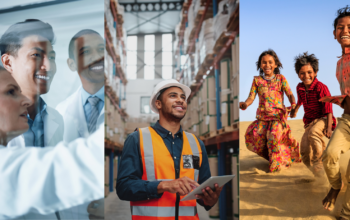Marie-Chantal Umunyana speaks to the strength of safe spaces in healthcare for women
Marie-Chantal Umunyana joins IFPMA and HYPER‘s virtual discussion on: “The Importance of Diversity & Equal Opportunities in a Healthy R&D Environment – Workplace & Organizational Culture.”
The discussion convened both young and senior leaders to identify and present initiatives by the pharmaceutical industry linked to creating and sustaining communities of belonging amongst youth that deliver solutions to patients and reach underserved communities.
Marie-Chantal, founder of Umubyeyi Elevate and participant of the Women Innovators Incubator, was joined by: Laura Adams, Global Programme Manager, Young Health Programme, Plan International UK; Sharon Olmstead, Global Head, Regulatory & Development Policy, Novartis; Rocio Martinez Perez, Research and Development Project Coordinator, UCB; and Courtney Sunna, Global Community Investment & Philanthropy Manager, AstraZeneca, who moderated the event.
Leading the discussion from the lower- to middle-income countries’ (LMICs) perspective, Marie Chantal, highlighted the need to create safe spaces to encourage information exchange between women while providing psychological support. She went on to explain that the safe spaces created by Umubyeyi have helped soon-to-be mothers and mothers express themselves freely and share their real-life, personal experiences to help one another.
Marie-Chantal also spoke to the importance of leveraging technology to improve access to maternal health information, since those in LMICs face challenges in accessing healthcare. Marie-Chantal explained that Umubyeyi uses technology to ensure women have easier access to more information about their maternal and reproductive health. “We are making evidence-based health information accessible to people from trusted sources using social media and web applications.” She believes that, given technology is an integral part of all of our lives, it can be used to improve maternal health.
Sharon Olmstead, Global Head, Regulatory & Development Policy, Novartis, shared her views on the need for diversity in clinical trials and referred to how technology can be an enabler. “As Marie-Chantal discussed, technology and social media can be enablers, reaching patients more inclusively and in ways we haven’t previously considered.”
Marie-Chantal also called on the healthcare sector to do more to ensure that mothers can access the healthcare they need wherever they are in Africa. She explains, “There is a need for pharmaceutical companies to guarantee and ensure new technology and treatments are available globally? to address preventable causes of mortality.”
Speaking in support of safe spaces in a broader context, Laura Adams, Global Programme Manager, Young Health Programme, Plan International UK, further described safe spaces as those, “in which people can discuss their experiences and understand what the people who need that safe space will need to feel safe in that environment.”
“To create a safe space it is important to create this sense of belonging”’ added Rocio Martinez Perez, Research and Development Project Coordinator, UCB. “We have to make room for young talent who are born in the digital era. As a newcomer in pharma, I think change comes from everywhere. We need to make sure all voices are heard and everyone is represented”
Rocio also noted that her organization created two initiatives, called Guide Me and Explorer, to create a more welcoming environment for young people. . “Guide Me is a mentoring program for those in senior positions, while, in the Explorer program, you can work in a different department for three months to discover something you might like since we’re seeing less and less linear careers,” she noted.
In closing, Courtney Sunna, Global Community Investment & Philanthropy Manager, AstraZeneca, circled back to gender equity and the need to support more women in science, technology, engineering, and mathematics (STEM). “I know that young women have been disproportionately impacted by the COVID-19 pandemic, more likely to have disruptions to their education and less likely to access healthcare. As a result, they are less likely to enter the workforce, which can impact their careers and economic opportunities globally. So, let’s all support women in STEM.”
This article was originally published on Africa Young Innovators for Health Award on 29 March 2022.





